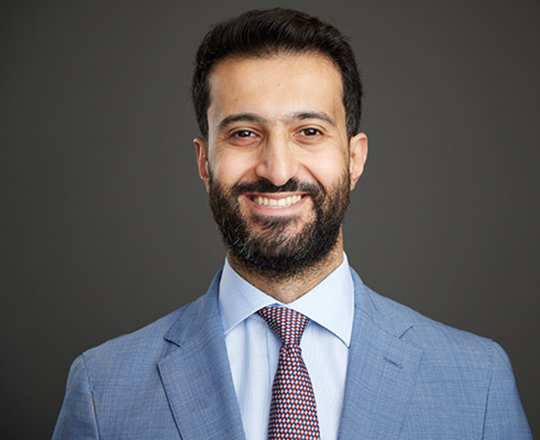
Hassan Moukhadder is an anterior segment clinical fellow in ophthalmology at the Wilmer Eye Institute. He attended American University of Beirut for medical school and trained in internal medicine and ophthalmology. His interests include leadership in medicine and in global ophthalmology and global health.
As a fellow in training at the Wilmer Eye Institute, my journey has been filled with challenges, learning opportunities and moments of deep human connection. Among these, one particular experience in the cornea clinic stands out — it is a profound reminder of the art of medicine beyond the technical mastery of surgical techniques and clinical knowledge.
It was a busy clinic day, and I met Ms. C, a middle-aged woman with a long history of corneal disease and recurrent infections that had left her vision severely impaired. Her medical file spoke volumes: a history of multiple corneal transplants and prior surgeries that had failed to restore her vision, and a complicated regimen of eye drops. Despite the technical details, her demeanor immediately caught my attention — she was not just a patient battling a chronic condition, but also a person weighed down by years of frustration and hopelessness.
During our initial conversation, Ms. C shared her story. She spoke of how her vision loss had robbed her of independence and joy, leaving her isolated and unable to pursue her passions, like painting. Her frustration was palpable as she recounted her struggles to adhere to a demanding treatment plan. More than seeking answers, she wanted to be heard and understood.
I took the time to listen — truly listen. This simple act allowed her to share not only her challenges but also her fears and hopes. As we discussed her medical history, it became clear that beyond her physical condition, she was battling the emotional toll of years of limited progress.
My role as her physician-in-training required more than clinical expertise. It demanded empathy and the ability to tailor a treatment plan to her unique needs. After consulting with my attending, we developed a strategy that balanced medical necessity with her lifestyle. We simplified her treatment regimen, addressed her concerns about potential side effects and ensured she had the resources to stay consistent with her care. One moment that will stay with me forever was when I showed her the anterior segment imaging of her eye. I explained how the interventions we were planning could help her. For the first time, I saw a flicker of hope in her eyes. She thanked me, not just for the medical care, but for treating her as a person rather than a case file.
The follow-up visits reinforced the power of a patient-centered approach. Ms. C’s corneal condition improved, and so did her outlook. She expressed gratitude for having been given not only a clearer treatment plan but also the reassurance that someone genuinely cared about her journey. This experience has profoundly influenced my approach to patient care. It underscored the importance of seeing the patient as a whole person, understanding their struggles and walking alongside them in their journey. As an anterior segment fellow at Wilmer, I am privileged to witness the transformative power of vision care, but it is these human connections that give my work its deepest meaning.
Looking back, Ms. C reminded me why I chose ophthalmology and academic medicine: to restore vision and hope, one patient at a time. This encounter reaffirmed that while clinical knowledge and surgical skills are vital, compassion and empathy are equally essential in making a meaningful impact. This lesson, I believe, will stay with me throughout my career, guiding me to always prioritize the patient’s humanity above all else.
 Personomics: Knowing Each Patient As a Person
Personomics: Knowing Each Patient As a Person
“It is much more important to know what sort of a patient has a disease than what sort of a disease a patient has.” – Sir William Osler
Personomics is a blog series featuring essays from residents and clinical fellows about their experiences knowing each patient as a person. The term personomics recognizes that understanding the unique attributes and life experiences of each person and the environmental, cultural, behavioral and economic factors that influence an individual’s life are as important to patient care as genomics, proteomics, pharmacogenomics and other “–omics.” Practicing personomics makes patients feel cared for and heard; provides critical information that helps establish a diagnosis and tailor a patient’s treatment plan to the individual; and allows physicians to derive greater meaning from their work, serving as an antidote to burnout and improving well-being.
Submit an essay to Personomics
Read more Personomics blog posts
